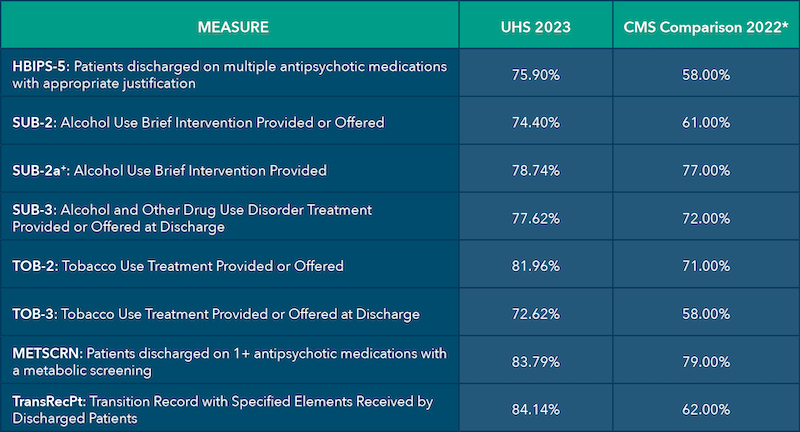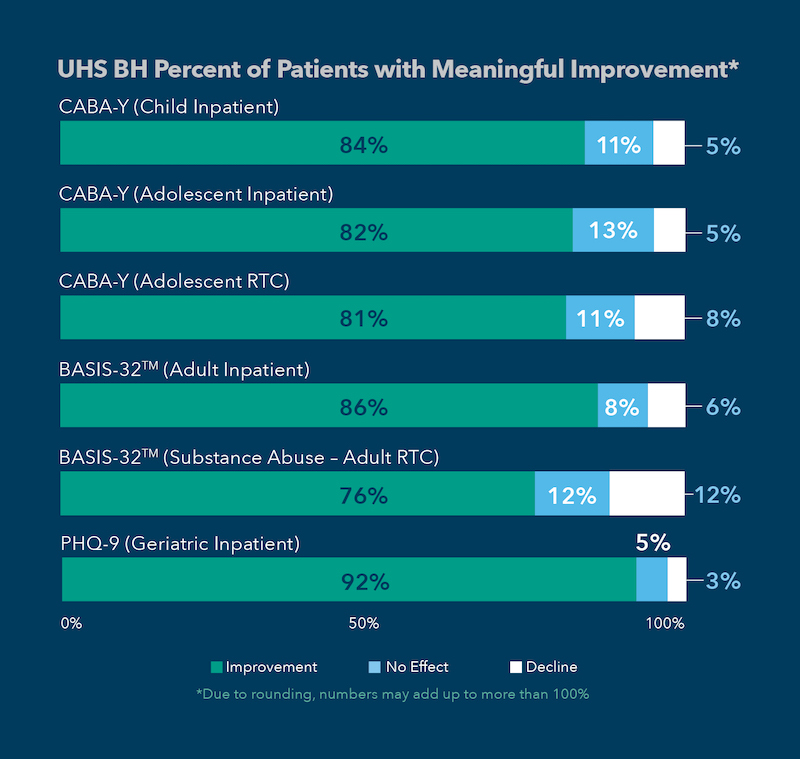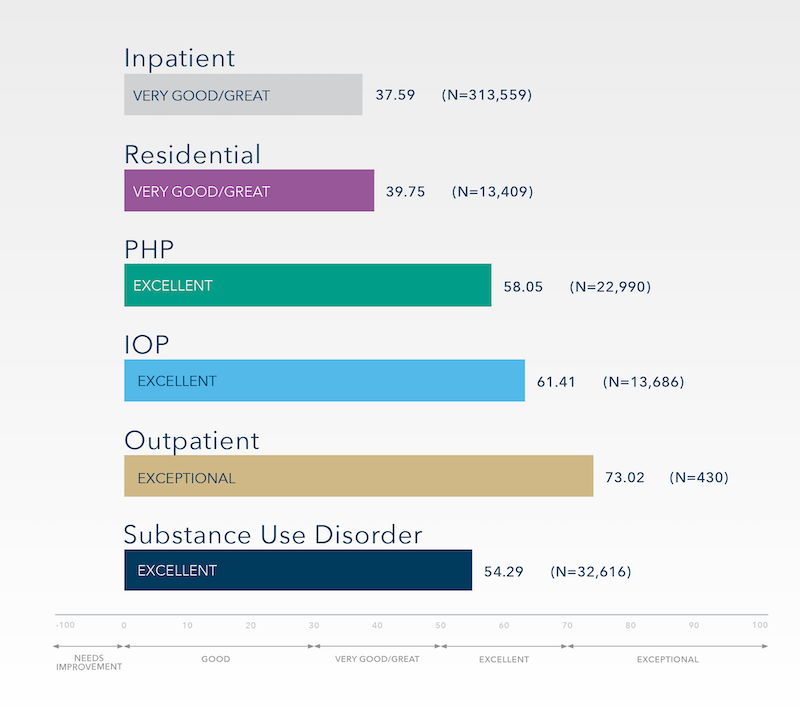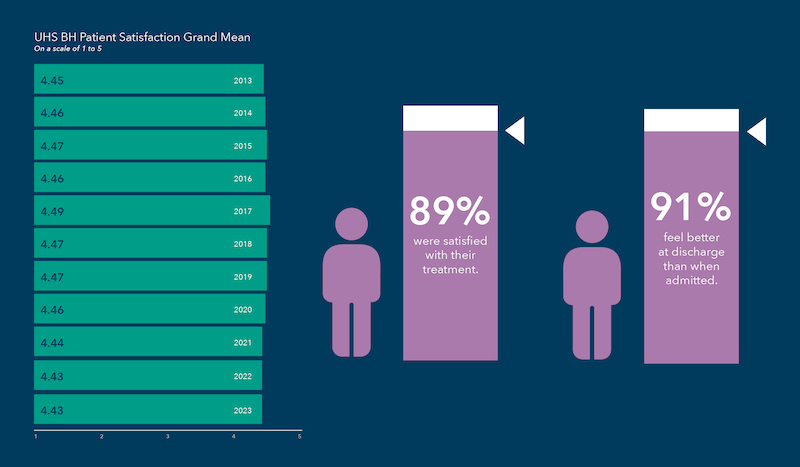Our Impact in 2023 By the Numbers
 The Clinical Services Department and Mental Health Outcomes, LLC are pleased to share the Our Impact in 2023 By the Numbers report highlighting the Behavioral Health Division’s clinical and quality outcomes successes.
The Clinical Services Department and Mental Health Outcomes, LLC are pleased to share the Our Impact in 2023 By the Numbers report highlighting the Behavioral Health Division’s clinical and quality outcomes successes.
The principles of UHS are borne out in this report reflecting our provision of superior quality patient care and recognizing and valuing each member of our team and their good work.
For a complete view of our U.S. Behavioral Health facilities’ clinical outcome measures and patient survey results, please read Our Impact in 2023 By the Numbers.
 Karen E. Johnson, MSW
Karen E. Johnson, MSW
Senior Vice President, Chief Clinical Officer
Behavioral Health Division, Universal Health Services
Exceeding National Quality Scores
Since we entered the behavioral health industry in 1983, patients have been our top priority. Our teams continue to be focused on treating individuals with respect, operating with integrity and providing superior quality care.
Guided by the principal of continuous improvement in measurable ways, we continue to monitor our progress against our goals using clinician ratings and patient self-report symptom scales.
Clinical and Quality Outcomes
UHS Behavioral Health facilities in the United States participate in CMS’ Inpatient Psychiatric Facility Quality Reporting Program (IPFQR), a program used by approximately 1,500 psychiatric providers across the nation to measure a broad set of evidence-based clinical practices linked to positive patient outcomes. UHS Behavioral Health facilities’ aggregated results continued to outperform industry benchmarks across key quality measures.
The U.S. facilities also participate in surveys by The Joint Commission which developed The Hospital-Based Inpatient Psychiatric Services (HBIPS) ‘core’ measures. Hospitals that effectively integrate these processes into clinical and quality improvement practices should positively impact the care of psychiatric patients.
Below are some of our 2023 results:
UHS Behavioral Health Outperforms Industry on Key Metrics
(higher rates desired)
+ We respect the patient’s right to refuse these offerings.
* Comparison Results based on 2022 discharges for CMS measures.
Comparison groups include units in medical surgical facilities.
Quote: The effectiveness of our treatments and dedication of staff continues to be exemplified by the multiple above-average industry scores as well as the high satisfaction ratings received across our continuum of services."
Mark Friedlander, MD, MBA
Chief Medical Officer, UHS Behavioral Health Division
UHS Behavioral Health facilities also received the following laudable distinctions:
- Arrowhead Behavioral Health (Ohio), Black Bear Lodge (Ga.), Calvary Healing Center (Ariz.), La Amistad Behavioral Health Services (Fla.), Poplar Springs Hospital (VA.), Summit Oaks Hospital (N.J.), Talbott Recovery (Ga.), Talbott Recovery Dunwoody (Ga.), University Behavioral Center (Fla.) and Wekiva Springs Center (Fla.) earned Blue Cross Blue Shield’s Blue Distinction® Center for Substance Use Treatment and Recovery.
- Black Bear Lodge (Ga.), La Amistad Behavioral Health Services (Fla.), PRIDE Institute (Minn.), Talbott Recovery (Ga.) and The Ridge Behavioral Health System (Ky.) were recognized on Newsweek/Statista’s list of America's Best Addiction Treatment Centers for 2023.
- The Brook KMI earned Kentucky Hospital Association’s 2023 Quality Award for Psychiatric Hospitals.
- In 2023, Cygnet outperformed the national average in regulatory ratings with 83% of services evaluated across the U.K. rated Good or Outstanding and 100% of inpatient schools in Cygnet’s Child and Adolescents Mental Health Services (CAMHS) rated ‘Good.’
2023 Clinical Outcomes
UHS uses comprehensive evidence-based clinical outcome assessment metrics to benchmark our performance in efforts to continuously enhance our patients’ experience and satisfaction. Sharing these results with patients and families weighing treatment options, as well as payers contemplating coverage decisions, validates the high quality of our services.
Patient improvement data was collected from patients, informants and/or clinicians at the time of admission and upon discharge through various assessment tools. Assessments used are targeted to treatment populations (i.e., child inpatient, adolescent RTC, adult inpatient, etc.). When evaluating results UHS measures statistically meaningful improvement, or that change which can be attributable to treatment.
- In 2023, 172 UHS Behavioral Health facilities in the U.S. with 968 distinct programs captured severity rating scales for approximately 425,743 patients.
- Overall, 83% of our participating patients experience statistically meaningful improvement on patient and informant symptom rating scales.
Patients have statistically meaningful improvement if their change is large enough to be attributable to treatment. Patients identified as having ‘No Effect’ may have experienced positive change, however, their change was not clearly evident as measured by the rating scale.
2023 Net Promoter Score
The Net Promoter Score (NPS) is a measure to gauge the loyalty of customers, consumers and patients and has been widely adopted by more than two-thirds of Fortune 1000 companies. We measure loyalty using the question, “How likely would you be to recommend our facility to a friend or family member?” In 2023, the UHS Behavioral Health Division NPS was 40 overall, on a scale of -100 to 100.
Favorable NPS ratings were also noted across our programs of varying levels of care:
2023 Patient Satisfaction Scores
- UHS’ Behavioral Health facilities continue to receive high patient satisfaction ratings in 2023. From the more than 380,370 anonymous patient satisfaction surveys, we learned UHS Behavioral Health patients rated their overall satisfaction a 4.4 on a scale of 1 (strongly disagree) to 5 (strongly agree). Research suggests that higher patient satisfaction is associated with improved treatment outcomes.
- In 2023, 91% of patients surveyed reported that they felt better after care, and 89% of patients surveyed indicated that their treatment goals and needs were met.
Click image to expand
Our education programs enable youth to continue their academic education at our facility while receiving treatment. UHS provides personalized learning plans that meet each patient where they are upon admission and prepares them for a seamless transition back to their traditional school environment. Of approximately 1,320 parents or guardians of youth receiving treatment who responded to our survey, 85% agree that the academic staff truly caresd about their child, while 82% report being satisfied with the facility’s education programs.
With the support of our dedicated educators, principals and support staff, 136 students completed their high school requirements in 2023.
Quote: We are proud of our students’ academic successes throughout the Division. We also take great pride in our educators’ and Directors’ efforts to provide equitable and quality educational experience for their students and their unwavering focus on continual school improvement.”
Karen E. Johnson
Senior Vice President, Chief Clinical Officer, UHS Behavioral Health Division
For a complete view of UHS Behavioral Health facilities’ clinical outcome measures and patient survey results in 2022, please read the Our Impact in 2022 By the Numbers report →






